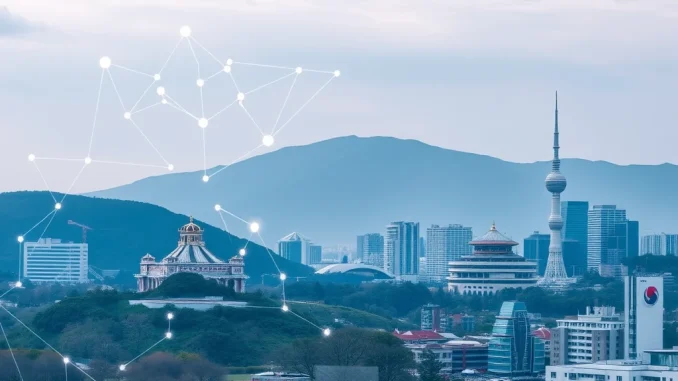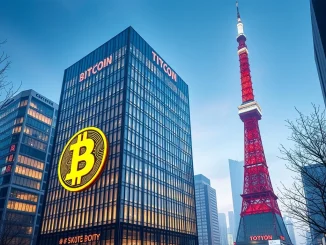
The world of digital assets is rapidly evolving, and governments globally are beginning to grapple with how to integrate this technology into their economies and regulatory frameworks. For those following the crypto space, particularly in Asia, a significant development is unfolding in South Korea. The Democratic Party of Korea (DPK), a major political force, has taken a notable step by establishing a dedicated committee focused on digital assets as part of its preparations for the upcoming presidential election. This move signals a growing recognition of the importance of cryptocurrencies, blockchain technology, and the broader digital economy in the country’s future.
Why is South Korea’s Democratic Party Focusing on Digital Assets?
South Korea has a vibrant tech scene and a significant population interested in cryptocurrency. The formation of this committee by the Democratic Party highlights a strategic effort to address the complexities and opportunities presented by digital assets. It suggests that political parties are increasingly viewing this sector not just as a fringe interest, but as a critical area for policy development and economic strategy ahead of a major election.
According to reports, the DPK’s presidential election preparation committee has officially launched its digital asset committee. The inaugural meeting marks the formal beginning of their work to shape the party’s stance and potential future policies regarding this sector. This initiative is likely driven by a desire to:
- Engage with the large base of crypto investors and enthusiasts in South Korea.
- Develop policies that can foster innovation in the blockchain and digital asset space.
- Address concerns around investor protection and market stability through effective crypto regulation.
- Position the party as forward-thinking on technological and economic trends.
Inside the Digital Asset Committee: Structure and Goals
The structure of the newly formed committee reveals its dual focus. It comprises two distinct subgroups, each tasked with a specific area of responsibility:
- Industrial Growth and Innovation: This subgroup will likely explore ways to promote the digital asset industry within South Korea, identifying opportunities for economic growth, job creation, and technological advancement related to blockchain and related technologies.
- Supporting Policy and Legal Frameworks: This subgroup is crucial for developing the necessary regulatory environment. Their work will involve proposing policies and legal structures that can provide clarity, ensure investor safety, and prevent illicit activities, essentially shaping future blockchain policy.
The overarching aim stated for these subgroups is to build a system that encourages collaboration between policy advisors and the private sector. This indicates a recognition that effective policy in the digital asset space requires input and understanding from the businesses and individuals actively involved in the market.
Potential Impact on South Korea Crypto Landscape
The actions and recommendations of this committee could have a significant impact on the future of South Korea crypto markets and the broader digital asset ecosystem. Depending on the policies they propose, we could see:
- Clearer guidelines for cryptocurrency exchanges and businesses.
- Initiatives to promote blockchain technology adoption in various industries.
- New approaches to taxation and investor protection.
- Potential shifts in how the government approaches initial coin offerings (ICOs) or other fundraising methods involving digital assets.
The focus on fostering collaboration between policymakers and the private sector is particularly promising. It suggests an attempt to create regulation that is both effective in managing risks and conducive to innovation, rather than stifling it. The development of thoughtful crypto regulation is key for the sustainable growth of the market.
What Does This Mean Ahead of the Election?
For the Democratic Party, taking a proactive stance on digital assets could be a strategic move to attract voters, particularly younger demographics who are more likely to be involved in the crypto market. By demonstrating a commitment to understanding and developing policies for this sector, they may aim to position themselves as the party best equipped to navigate the future digital economy.
The recommendations put forth by this committee will likely form a part of the DPK’s platform heading into the presidential election. Competing parties may also feel pressure to articulate their own positions on digital assets, potentially leading to a more robust public debate on the future of crypto and blockchain in South Korea.
Conclusion: A Significant Step for South Korea’s Digital Future
The establishment of the digital asset committee by South Korea’s Democratic Party is a significant development. It underscores the growing importance of cryptocurrencies and blockchain technology on the political agenda. By creating dedicated subgroups for industrial growth and policy frameworks, and aiming for collaboration with the private sector, the DPK is signaling a serious effort to develop comprehensive strategies for this complex space. As the presidential election approaches, the work of this committee will be closely watched by industry participants, investors, and the public alike, offering a glimpse into the potential future direction of digital asset policy in South Korea.



